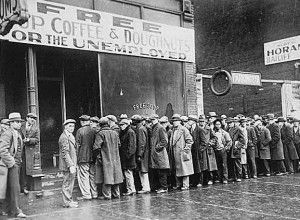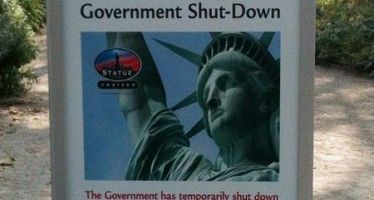Low Interest Rates Will Kill Tax Hikes
By WAYNE LUSVARDI
All the proposed ballot initiatives to increase taxes in California are headed for a hard fall at the ballot box – because the economy is sluggish. And the economy won’t pick up speed unless savers and pensioners begin to realize a high enough interest rate on their investments.
That is what can be inferred from a number of economists who have recently explained why the U.S. and California economies are recovering so slowly, if at all.
Economist Carmen M. Reinhart has recently observed that very low interest rates set by government are imposing a “repression tax” on interest earnings. This “repression tax” is transferring wealth from savers and pensioners to borrowers, and in some cases, to governments.
Economist Robert, Higgs in his article “The Fed’s Immiseration of People Who Live on Interest Earnings,” has similarly observed that the low level of interest income has broken the investment cycle between generations. The economic cycle is where young people take out mortgages and business loans and pay interest to older savers and pensioners who loan them money. But with abnormally low interest rates, there is no money for the elderly to spend or reinvest.
Echoing Reinhart and Higgs, economist Bruce Bartlett has stated the cost of the government’s policy of deliberately holding down interest rates has been to squelch an economic recovery.
Thus, raising taxes $9 billion, as Gov. Jerry Brown has proposed, or $10 billion, as lawyer Molly Munger wants, would be economic suicide for California. Such ballot initiatives would impose heavy taxes without priming the pump to get the economy flowing again.
A mild rise in jobs — that often appear before elections and disappear afterwards — is not a sole indicator of economic recovery. Nor does a mild rise in jobs a signal that taxes can be raised despite continued suppression of interest rates by government policy.
For example, a separate proposed ballot initiative to eliminate Proposition 13 reassessment protections for commercial properties — called a “split roll property tax” — alone would increase the state unemployment rate from 9.9 to 13.1 percent.
As long as very low interest rates are robbing savers and retirees of their wealth and suppressing an economic recovery, it is highly unlikely that any of the proposals to raise taxes on the Nov. 2012 ballot will succeed. The tax proposals on the upcoming California ballot are diverting attention from larger federal policy that is squelching an economic recovery.
Yet More Taxes
There are even more taxes in the pipeline: cigarette taxes, oil taxes, gas taxes, out-of-state business taxes, and imposing reassessments for commercial property taxes every year instead of when a property resells, as is now provided under Proposition 13. The tax proposal on oil and gas would increase such taxes 40 percent higher than any other state in the Union.
These tax proposals do not include the $11.1 billion Water Bond scheduled to also be on the ballot. The water bond actually would cost about $18 billion with matching fund requirements. Counting interest, the Water Bond would cost about $36 billion.
A Suppression Tax
Economist Carmen Reinhart states that there have been five ways throughout history that governments have reduced debt:
* Economic growth;
* Austerity plans;
* Default or restructuring of debt;
* Inflation, often surprising;
* A steady dose of financial repression accompanied by inflation.
Reinhart says the current U.S. government policy is suppression of interest rates to investors and savers in order to transfer wealth to borrowers and government.
Reinhart indicates that the “effective interest rate” — the face interest rate minus monetary inflation — is negative for about half of Treasury bill rates. Moreover, interest rates are below 1 percent in about 82 percent of T-bills. Meanwhile, monetary inflation is running about 3.5 percent or higher. Thus, the principal in any bank account is being eaten away by unseen tax termites.
Reinhart puts it this way:
“Unlike income, consumption or sales taxes, the ‘repression’ tax rate is determined by factors such as financial regulations and inflation performance, which are opaque — if not invisible — to the highly politicized realm of fiscal policy. Given that deficit reduction usually involves highly unpopular spending cuts and/or tax increases, the ‘stealthier’ financial-repression tax may be a more politically palatable alternative.”
We are unlikely to see any turnaround in federal monetary policy soon to change “repressive” interest rates. On March 14, the U.S. Federal Reserve announced it would continue its exceptionally low interest rate policy for another two years.
The Tax Crunch
California government and public schools have mainly only cut “fluff” out of their budgets over the past three years. There have been virtually no substantial core teacher layoffs. With the state budget continuing to run a deficit, California government may be staring at real budget cuts to core services. Thus, there has been political momentum within government and unions to increase taxes, but mainly on the “rich.”
But the rich, along with the middle class, are unlikely to vote for such tax increases as long as interest rates are politically suppressed to reduce government debt burdens.
Moreover, none of the major tax proposals floated by government and unions thus far has included even an iota of pension reform. Brown’s 12-point pension reform is not substantial enough, and unlikely to go anywhere.
Thus, California is probably going to have to resign itself to slow growth and further budget cuts until the debt burdens are reduced.
Related Articles
Families, Not Relief, Still Safety Net
MARCH 18, 2011 By WAYNE LUSVARDI With implications for California budget discussions, a new study shows that unemployment benefits delay
Shutdown: Where CA Lawmakers Stand
For the first time in 17 years, the federal government has shut down. As CalWatchdog.com has previously explained, this doesn’t
Fired official slams state 'fire sale'
APRIL 16, 2010 By KATY GRIMES A complex administration plan to sell state-owned properties and then lease them back from




